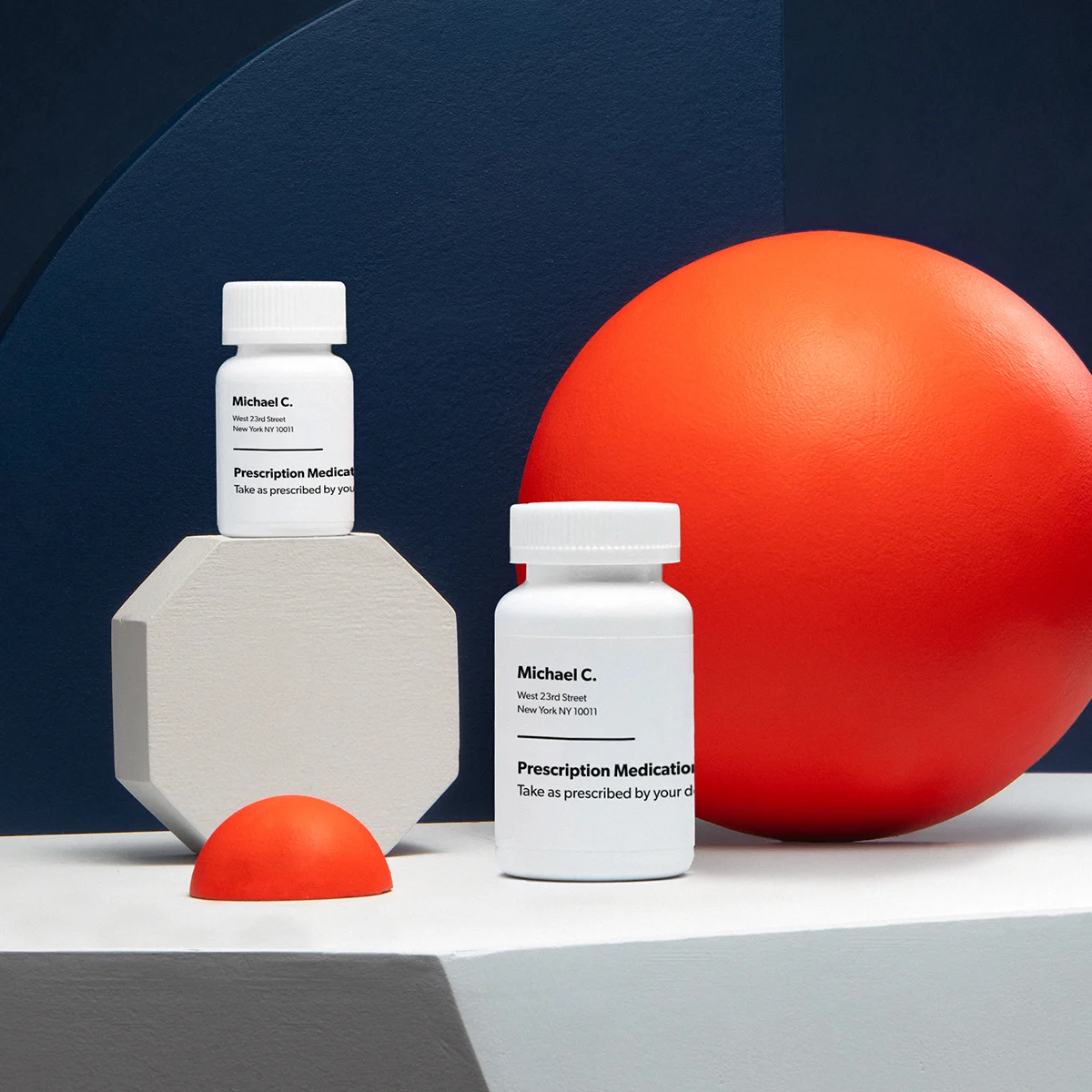Here's what we'll cover
Here's what we'll cover
If you have genital herpes or cold sores (a.k.a. oral herpes), you probably don't want to waste too much time finding the most effective medication to treat it. Three antiviral medications—valacyclovir, acyclovir, and famciclovir—are commonly prescribed to alleviate symptoms and reduce or prevent future outbreaks. All three drugs work in a similar way, by blocking the herpes virus from replicating. But there are differences between them, including how long they've been on the market and how commonly they're prescribed.
Below, we'll take a look at valacyclovir vs. acyclovir vs. famciclovir, so you can ensure you're on the right medication for you. If you're unsure or have questions, talk to your healthcare provider.
What is valacyclovir?
Valacyclovir (brand name Valtrex) is the most commonly prescribed drug for treating herpes. It's probably the first medication your doctor will prescribe for a herpes outbreak.
Oral valacyclovir was approved by the FDA in 1995 to treat cold sores (herpes labialis) and genital herpes, which are caused by herpes simplex virus 1 (HSV-1) and herpes simplex virus 2 (HSV-2). The medication is also used to treat shingles (herpes zoster), which is caused by the varicella zoster virus (VZV). Valacyclovir is available in 500 mg and 1000 mg tablets.
Valacyclovir Important Safety Information: Read more about serious warnings and safety info.
How it works
Valacyclovir is antiviral therapy—it lowers the ability of herpes viruses to multiply in your body. Valacyclovir is a prodrug, meaning it converts into another drug inside the body. When you take a tablet of valacyclovir, it’s converted into the active substance acyclovir. Acyclovir prevents the herpes virus from reproducing, helping to control the symptoms of a herpes outbreak.
Oral valacyclovir starts working almost as soon as you start taking it, although it can take up to 10 days for herpes blisters to heal (Modi, 2008). The dosage differs depending on whether it's being used to treat outbreaks of oral herpes, genital herpes or shingles.
How effective is it?
Studies show that valacyclovir can speed healing of a herpes outbreak, reduce the incidence of recurrent herpes, and can lower your risk of transmitting herpes to your partner (Spruance 2003; Hollier, 2015).
Valacyclovir has a suppressive effect—not only reduces the number of recurrent outbreaks a person experiences when using the medication every day, it reduces the number of days that someone sheds the virus asymptomatically. That can result in fewer uninfected partners contracting herpes infections. If a condom is worn during sexual activity and the medication used, the chances are reduced at least by half compared with using a condom alone.
Read more about valacyclovir—including dosages, side effects, and the conditions it treats—in our guide to valacyclovir.
What is acyclovir?
Acyclovir (also known by its brand name Zovirax) is an older antiviral medication that’s still commonly used to treat herpes and shingles. Discovered in the late 1970s, it was the first highly effective medication against herpes and was used as a first-line treatment against HSV-1, HSV-2, and shingles for decades.
How it works
Acyclovir works in a targeted way against herpes DNA to prevent it from replicating. DNA is made up of four repeating chemicals called nucleosides. Acyclovir is almost an identical copy of one of those nucleosides (guanine). When acyclovir is added to the growing DNA chain, it makes it impossible to add the next link, and DNA synthesis is stopped.
How effective is it?
A limitation of acyclovir was its bioavailability, or how much of the drug could be absorbed by the body—only about 20% of an oral dose. Researchers overcame that by creating the prodrug valacyclovir: By tweaking the acyclovir molecule slightly, they created a medication that was absorbed more efficiently in the digestive tract. Valacyclovir has an oral bioavailability level of about 55 percent.
Once absorbed, valacyclovir is converted to acyclovir in the body, where it fights the herpes virus, helping to control symptoms and reduce your risk of transmitting the virus. Taken twice a day—or even once a day—valacyclovir works better than 3 to 5 daily doses of acyclovir (Miserrochi, 2007).
Studies show that acyclovir is effective against the herpes virus—you just need to take more of it than you do valacyclovir.
Both acyclovir and valacyclovir are also prescribed to people with chickenpox (varicella-zoster virus, or VZV) who risk having a severe reaction to that virus, such as people over age 12, those with lung disease, or people who are taking corticosteroids.
What is famciclovir?
Famciclovir (also known by its brand name Famvir) is another antiviral drug prescribed to combat some types of herpes infections. But unlike valacyclovir and acyclovir, which are usually prescribed for HSV-1 and HSV-2, famciclovir is typically used to treat shingles (herpes zoster).
How it works
Just as valacyclovir is an updated "prodrug" version of acyclovir—a variant that allows more of the active ingredient to be absorbed by the body—famciclovir is a prodrug of penciclovir.
Penciclovir was FDA approved in 1996 as a treatment for cold sores (herpes labialis). Because it was poorly absorbed as an oral medication, it was largely prescribed as a topical cream. It's the active ingredient in cold sore medications Denavir, Vectavir and Fenivir.
With its better oral bioavailability, famciclovir is used as a treatment for shingles, a painful, blistering rash experienced by people who previously had chickenpox.
Famciclovir has also been shown to be effective at controlling oral herpes and genital herpes in people with compromised immune systems, and it's occasionally prescribed as an alternative to valacyclovir and acyclovir in those cases.
DISCLAIMER
If you have any medical questions or concerns, please talk to your healthcare provider. The articles on Health Guide are underpinned by peer-reviewed research and information drawn from medical societies and governmental agencies. However, they are not a substitute for professional medical advice, diagnosis, or treatment.
Hollier, L. M., & Eppes, C. (2015). Genital herpes: oral antiviral treatments. BMJ Clinical Evidence, 2015 , 1603. Retrieved from https://www.ncbi.nlm.nih.gov/pmc/articles/PMC4389798/
Miserocchi, E., Modorati, G., Galli, L., & Rama, P. (2007). Efficacy of valacyclovir vs acyclovir for the prevention of recurrent herpes simplex virus eye disease: a pilot study. American Journal of Opthalmology, 144 (4): 547-551. doi: 10.1016/j.ajo.2007.06.001. Retrieved from https://www.ncbi.nlm.nih.gov/pubmed/17692271
Modi, S., Van, L., Gewirtzman, A., Mendoza, N., Bartlett, B., Tremaine, A. M., et al. (2008). Single-day treatment for orolabial and genital herpes: a brief review of pathogenesis and pharmacology. Therapeutics and Clinical Risk Management, 4 (2): 409-417. doi: 10.2147/tcrm.s1664. Retrieved from https://www.ncbi.nlm.nih.gov/pmc/articles/PMC2504076/
Spruance, S. L., Jones, T. M., Blatter, M. M., Vargas-Cortes, M., Barber, J., Hill, J., et al. (2003). High-dose, short-duration, early valacyclovir therapy for episodic treatment of cold sores: results of two randomized, placebo-controlled, multicenter studies. Antimicrobial Agents and Chemotherapy, 47 (3): 1072-1080. doi: 10.1128/AAC.47.3.1072-1080.2003. Retrieved from https://www.ncbi.nlm.nih.gov/pmc/articles/PMC149313/










